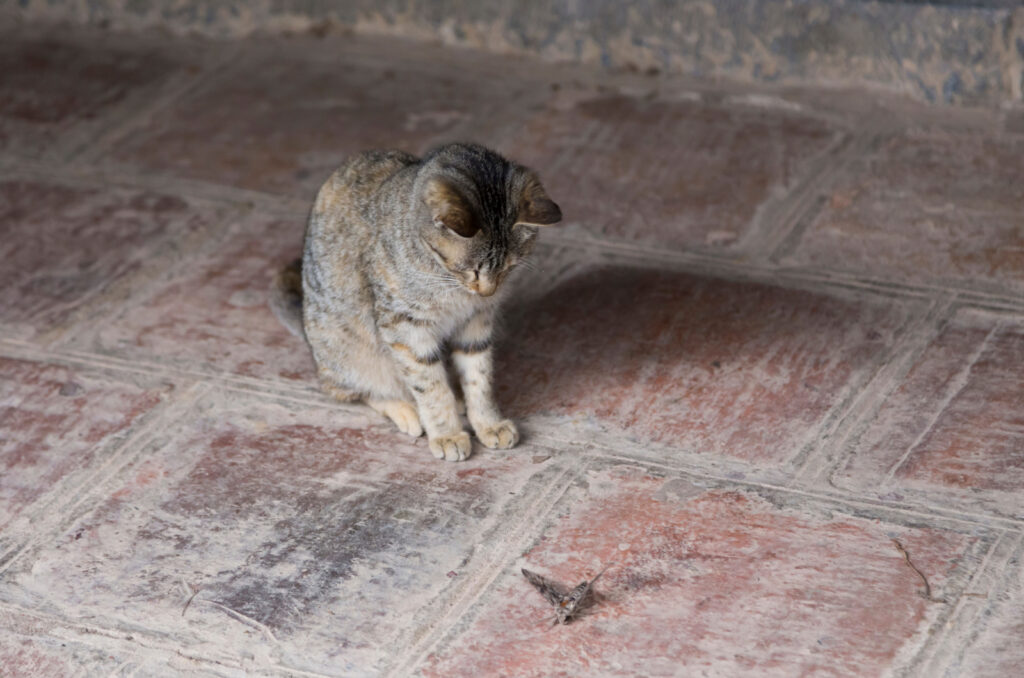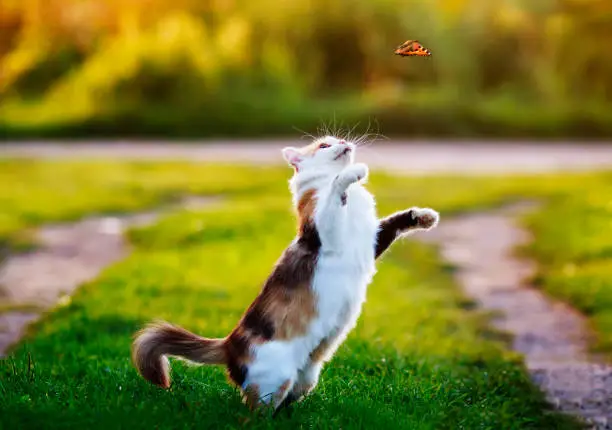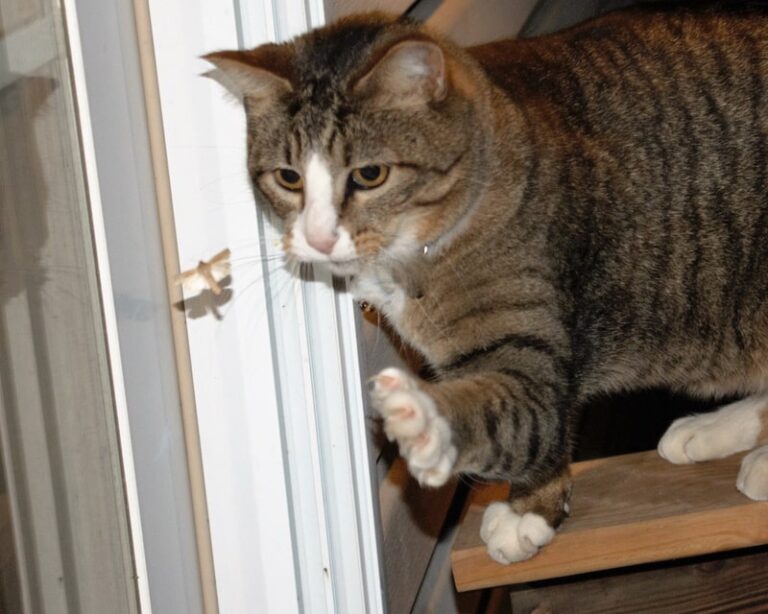Cats can eat moths without major health concerns, but precautions are necessary. Moths are not toxic, but they can pose a choking hazard, and moths exposed to pesticides may be harmful. Watch for allergies and potential parasites.
It’s best to discourage indoor moth consumption and ensure a balanced cat food diet for overall health. Consult a vet if you have any concerns about your cat’s diet or behavior.
How safe are moths for cats?
It’s important to balance the natural instinct of cats to hunt and play with their safety and well-being. While moths are generally safe for cats to consume in moderation, it’s advisable to supervise their interactions with insects, especially when found indoors.
Safety of moths for cats
Moths not toxic to cats: Moths themselves are generally not toxic to cats. They do not contain any known toxins or harmful substances that can cause immediate harm when ingested.
Cats, as obligate carnivores, have digestive systems adapted to process small prey animals, which include insects like moths.
In the wild, cats often consume a variety of small animals, including insects, as part of their natural diet.
Potential concerns

Choking hazard: One of the primary concerns with cats eating moths is the risk of choking. Moths have delicate wings and body parts that can be swallowed whole by a cat without proper chewing.
Ingesting a moth whole can lead to a choking hazard, especially in kittens or cats that tend to swallow their prey without chewing.
Exposure to pesticides: Moths found indoors, especially in homes where pest control measures are used, may have come into contact with pesticides or other chemicals.
Ingesting moths contaminated with pesticides can be harmful to cats, as these chemicals can be toxic and may lead to symptoms of poisoning.
Allergies: Some cats may develop allergies to certain insects, including moths. Allergic reactions can manifest in various ways, such as itching, skin rashes, sneezing, or digestive upset.
However, if your cat exhibits any unusual symptoms after consuming moths, it’s essential to consult a veterinarian to determine if an allergy is the cause.
Parasites: While the risk is relatively low, wild moths may carry parasites that could potentially be transmitted to your cat.
Cats can contract internal parasites, such as tapeworms, from ingesting infected prey, though this is more common with rodents than with insects. Moreover, regular deworming and monitoring for signs of parasitic infections can help mitigate this risk.
What precautions should You take when Your cat plays with moths?
Taking precautions when allowing your cat to engage with moths or other insects is vital to ensure their safety. Supervision helps prevent accidents, and avoiding chemical exposure from indoor moths is advisable.
Supervision when cats play with or eat moths
Supervision is crucial when allowing your cat to interact with moths or other insects. Cats can be quite enthusiastic when hunting, and this can lead to unintended consequences.
While it’s natural for cats to chase and play with insects, they may not always exercise caution when doing so. Supervising their interactions can help prevent potential accidents, such as swallowing a moth whole or injuring themselves during play.
Furthermore, if you notice your cat catching a moth, observe from a safe distance to ensure they handle it safely. If they swallow it, monitor for signs of choking or distress.
Indoor moths and chemical exposure
Indoor moths, such as pantry moths or clothes moths, may have come into contact with household chemicals or pesticides.
To minimize the risk of chemical exposure, consider using non-toxic methods for pest control within your home, especially in areas where your cat has access.
Store food items securely to prevent pantry moths, and regularly clean and vacuum areas where clothes moths might be found to reduce their presence.
Monitoring for signs of illness or allergies
After your cat has interacted with moths or other insects, it’s essential to monitor them for any signs of illness or allergies.
Signs of illness may include vomiting, diarrhea, lethargy, difficulty breathing, or distress.
Allergic reactions could manifest as itching, skin redness, hives, sneezing, or gastrointestinal
upset.
In addition, if you notice any concerning symptoms, consult your veterinarian promptly. They can assess whether the cat’s behavior is related to their interaction with moths or if there might be an underlying health issue.
How to emphasize a balanced cat food diet?

Maintaining your cat’s health starts with providing a balanced and appropriate diet. Consult your veterinarian to choose the right cat food and seek their advice on dietary concerns or unusual behavior.
Emphasizing a balanced cat food diet
Providing a balanced and nutritionally complete cat food diet is one of the most critical aspects of maintaining your cat’s health.
Cats are obligate carnivores, which means their diet should primarily consist of animal-based protein. Look for high-quality cat food brands that list a protein source (like chicken, fish, or beef) as the primary ingredient.
Ensure that the cat food you choose meets the nutritional guidelines established by reputable organizations, such as the Association of American Feed Control Officials (AAFCO). These guidelines ensure that the food provides the essential nutrients cats need to thrive.
Consider your cat’s age, activity level, and any specific dietary requirements when selecting cat food. For example, kittens, adult cats, and senior cats have different nutritional needs.
Consulting a veterinarian for dietary concerns or unusual behavior
Regular veterinary care is essential for your cat’s overall well-being. Consult your veterinarian for guidance on your cat’s diet and nutrition.
However, if you have concerns about your cat’s dietary preferences or their overall health, your veterinarian can provide tailored recommendations. They may recommend specific diets for cats with allergies, weight management issues, or medical conditions.
Unusual behavior, including excessive hunting of insects like moths, can sometimes be indicative of underlying health problems or behavioral issues. Your veterinarian can conduct a thorough examination to rule out medical issues and offer behavioral advice if needed.
Regular check-ups and discussions with your vet help ensure that your cat is receiving the right nutrition and care for their specific needs. They can also provide guidance on how to prevent common feline health issues.
FAQ’s
Do cats eat clothes moths?
Cats may play with or catch clothes moths due to their hunting instincts, but they typically don’t consume them as a significant part of their diet.
Is it OK for cats to eat flies?
Eating a fly occasionally is generally safe for cats and is considered a normal behavior. Flies are not toxic to cats.
Will cats eat cockroaches?
Cats are known to hunt and eat cockroaches. While cockroaches are not harmful when consumed in moderation, it’s essential to ensure they are not carrying pesticides or diseases.
Are mothballs toxic to cats?
Yes, mothballs contain toxic chemicals like naphthalene or paradichlorobenzene, which can be extremely harmful if ingested by cats. Keep mothballs out of their reach.
Can cats eat fries?
It’s not recommended to feed cats fries or other human junk food. Fries are high in salt and unhealthy fats, which can be harmful to cats’ health.
What human foods can cats eat?
Cats should primarily eat a balanced cat food diet. While some human foods like plain cooked chicken or fish are safe in moderation, it’s best to consult a vet for specific recommendations on suitable treats or additions to their diet.
Conclusion
In summary, when it comes to cats and moths, a balance between their natural instincts and their safety is crucial. Moths themselves are generally safe for cats to consume, but several precautions must be taken.
These include supervising their interactions with moths, especially indoors, to prevent choking hazards and potential exposure to pesticides. Monitoring for signs of illness or allergies after such interactions is essential.
Furthermore, while occasional moth consumption is unlikely to harm your cat, it’s vital to prioritize their health by providing a balanced cat food diet. If you ever have concerns about your cat’s diet, behavior, or well-being, consulting a veterinarian is the best course of action.
By striking this balance and being mindful of potential risks, you can ensure your feline companion enjoys a safe and healthy life.

